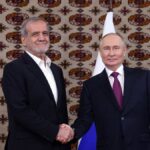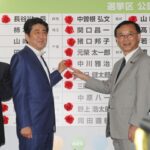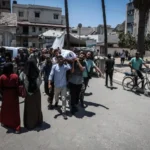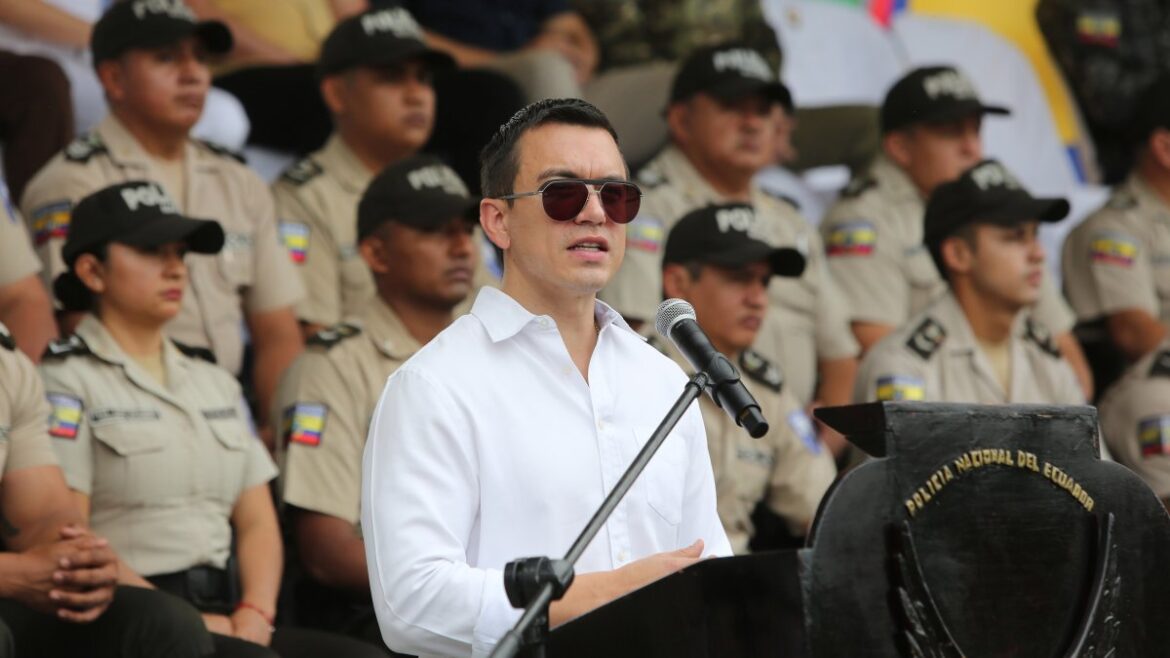Table of Contents
Ecuador is at a critical crossroads. Following the April 13, 2025, presidential runoff election, Daniel Noboa of the National Democratic Action Party (ADN) secured a decisive victory with 55.6% of the vote. With his party also controlling the National Legislative Assembly and key committees, Noboa has a strong mandate to pursue a security-focused agenda aimed at combating the country’s deepening crisis of crime and violence. As Noboa begins his full four-year term on May 24, 2025, the challenge is clear: to not only intensify the fight against drug trafficking and organized crime but also to leverage security cooperation as a driver of sustainable development.

Ecuador’s Security and Development Crisis
Ecuador faces soaring insecurity fueled by drug cartels, illegal economies, and institutional weaknesses. The country’s homicide rate has skyrocketed by over 540% since 2015, now the highest in the Western Hemisphere at 38.8 per 100,000 inhabitants. Poverty remains entrenched, with more than 5 million Ecuadorians living in extreme poverty or below the poverty line, primarily in rural and urban peripheral areas.
This dangerous mix of violence and underdevelopment threatens social stability and economic progress. Organized crime thrives in environments where state institutions falter and where poverty and environmental degradation persist unchecked.

Noboa’s Security-Centric Agenda: More Than Just Law Enforcement
President Noboa’s first legislative act—the Organic Law to Dismantle the Criminal Economy Linked to the Internal Armed Conflict—signals a commitment to dismantle criminal networks through financial, tax, and security measures. However, Noboa recognizes that heavy-handed policing alone won’t solve Ecuador’s challenges.
A comprehensive approach must integrate security cooperation with development strategies that address root causes such as poverty, corruption, and weak governance. Aligning counterdrug efforts with economic growth, job creation, environmental protection, and governance reforms can produce long-term, sustainable improvements.

The Role of International Cooperation
Ecuador’s security challenges are deeply interconnected with regional and global dynamics, particularly transnational cocaine trafficking. International cooperation—especially from partners like the United States, the European Union, and regional institutions—is essential to enhance Ecuador’s capacity to fight crime and build resilience.
Yet, cooperation efforts to date have often been fragmented. The Noboa administration has an opportunity to lead a more strategic and coordinated approach to maximize impact. Ecuador’s Ministry of Foreign Affairs and Human Mobility (MFAHM) recently established the Vice Ministry of International Cooperation to oversee and streamline foreign aid, ensuring alignment with national priorities and better coordination among donors and government agencies.

Recommendations for Maximizing Security and Development Impact
- Integrate Foreign Assistance into National Plans: Align all international cooperation with Ecuador’s national development plan and sectoral strategies to ensure cohesive policy and investment frameworks.
- Apply aid effectiveness principles: promote country ownership, alignment with national priorities, donor harmonization, managing for measurable results, and mutual accountability to improve aid outcomes.
- Foster Triangular and South-South Cooperation: Leverage peer-to-peer knowledge sharing and partnerships among traditional donors and emerging providers.
- Enhance Transparency and Coordination: Develop a centralized, accessible dashboard to map, track, and report foreign aid projects and results in real time, preventing duplication and increasing accountability.
- Engage Civil Society and Local Governments: To build local ownership and trust, include Indigenous groups, NGOs, academia, and the private sector in anti-corruption and social behavior change programs.
- Prioritize Border and Economic Zone Programs: Modernize customs, promote economic corridors, and establish binational development zones to reduce illicit activity and boost legal trade.
Aligning U.S. Assistance with Strategic Priorities
With U.S. foreign assistance budgets under review and realignment, support to Ecuador must be both targeted and transparent. Demonstrating how aid advances U.S. interests—such as national security, economic prosperity, and countering China’s regional influence—is key to sustaining and growing bilateral cooperation.
Ecuador’s ability to track and report measurable results will strengthen the case for continued U.S. investment and broader donor engagement.

Moving Forward: Political Will as the Catalyst
These reforms and strategies demand not just technical fixes but strong political will. President Noboa and his administration have a unique window during this first full term to operationalize a comprehensive international cooperation framework that enhances security, supports development, and fosters transparency.
By leading coordination among donors, government agencies, and civil society, Noboa can transform Ecuador’s response to organized crime and lay the groundwork for lasting stability and economic growth.
Conclusion
Ecuador’s fight against insecurity and narco-trafficking presents complex challenges but also opportunities. Through coordinated international cooperation, integrated security and development strategies, and transparent management of foreign aid, Ecuador can turn the tide on crime while advancing prosperity for its people.
WorldAffair.org will continue monitoring these developments and the role of international partners in supporting Ecuador’s journey toward peace and progress.
Author Profile

- Li Li, associate professor and master’s supervisor at Southwest University. B.A. in English for Education from Southwest Normal University, M.A. in English Translation and Interpretation from China Foreign Affairs University, Ph. D. in Japanese Cultural History from Nankai University (all above are in China). Also has studied at Osaka Sangyo University and Kokugakuin University in Japan and been a Fulbright visiting scholar to Western Kentucky University in US. A multidisciplinary and versatile instructor with a trilingual mastery of Chinese, English and Japanese, known for Combining foreign language teaching with history and humanity cultivation. Academic researches center on Japanese history, international relations and Western culture studies. Work experiences include teaching at Capital Normal University, Chongqing Normal University, and Southwest University. Has published multiple academic papers, translated works, authored or co-edited several textbooks and monographs; provided language services for several high-level and high-profile international events.
Latest entries
 GeopoliticsAugust 22, 2025The Limits of Russia’s Friendship: Moscow’s Calculated Response to the Iran Crisis
GeopoliticsAugust 22, 2025The Limits of Russia’s Friendship: Moscow’s Calculated Response to the Iran Crisis Japanese PoliticsJuly 22, 2025Japan’s Upper House Election: Prolonged Instability and Its Impact on Domestic and Foreign Policy
Japanese PoliticsJuly 22, 2025Japan’s Upper House Election: Prolonged Instability and Its Impact on Domestic and Foreign Policy Middle East AffairsJuly 20, 2025Will Israel Ever Face Consequences for Bombing Its Neighbours?
Middle East AffairsJuly 20, 2025Will Israel Ever Face Consequences for Bombing Its Neighbours? Energy & ClimateJuly 13, 2025Iran Conflict: Four Lessons Learned for the Oil Market
Energy & ClimateJuly 13, 2025Iran Conflict: Four Lessons Learned for the Oil Market



1 comment
Ecuador’s situation is deeply concerning, especially with the alarming rise in homicides and the pervasive influence of drug cartels. It’s encouraging to see President Noboa taking legislative steps to address the criminal economy, but I wonder if these measures will be enough without addressing the root causes like poverty and institutional weaknesses. The emphasis on international cooperation is crucial, but how can Ecuador ensure that this aid is used effectively and transparently? It’s also worth questioning whether the U.S. and EU’s support is driven more by their own interests than by genuine concern for Ecuador’s stability. The interconnectedness of regional and global dynamics makes this a complex issue, but I believe a holistic approach is essential. What specific strategies are being implemented to tackle poverty and improve institutional capacity? Without addressing these, the fight against insecurity might remain incomplete. Do you think Ecuador can achieve lasting stability without significant internal reforms alongside external support?